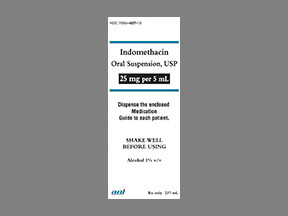
Indocin Coupons & Savings Card – Discount Prices from $467.32
Brand for: Indomethacin
My prescription
Edit
237ML of 25MG/5ML, Indomethacin (1 Bottle)
Select pharmacy

CVS
$1160.95
COUPON PRICE
Albertsons
$467.32
COUPON PRICE
Walgreens
$575.41
COUPON PRICE
Walmart
$2038.67
COUPON PRICEIndocin savings card
Show this card to your pharmacist
Albertsons
$467.32
BIN
ID
PCN
GRP
019876
LH670493F2
CHIPPO
LHX
Powered by
Related NSAIDs prescriptions
More prescriptions for rheumatoid arthritis
Related NSAIDs prescriptions
More prescriptions for rheumatoid arthritis
Indocin (Indomethacin) dosage forms
Dosage Quantity Price from Per unit 237ML of 25MG/5ML 1 Bottle $467.32 $467.32 237ML of 25MG/5ML 2 Bottles $927.15 $463.57 237ML of 25MG/5ML 3 Bottles $1386.97 $462.32
| Dosage | Quantity | Price from | Per unit |
|---|---|---|---|
| 237ML of 25MG/5ML | 1 Bottle | $467.32 | $467.32 |
| 237ML of 25MG/5ML | 2 Bottles | $927.15 | $463.57 |
| 237ML of 25MG/5ML | 3 Bottles | $1386.97 | $462.32 |
What is the drug Indocin used for?
Indocin is used to relieve pain, swelling, and joint stiffness caused by conditions such as arthritis, gout, bursitis, and tendonitis. It is a nonsteroidal anti-inflammatory drug (NSAID) that works by reducing hormones that cause inflammation and pain in the body.
Is Indocin the same as ibuprofen?
Indocin and ibuprofen are not the same. Indocin is the brand name for indomethacin, while ibuprofen is a different nonsteroidal anti-inflammatory drug (NSAID). Both are used to relieve pain and inflammation, but they have different chemical structures and may have different side effects and interactions.
What is the major side effect of indomethacin?
The major side effect of indomethacin is gastrointestinal irritation, which can lead to symptoms such as stomach pain, heartburn, nausea, and in more severe cases, ulcers or bleeding in the stomach or intestines. It is important for patients to monitor for these symptoms and consult a healthcare provider if they occur.
What are the side effects of INDOCID?
Indocid, also known as indomethacin, can have several side effects. Common side effects include gastrointestinal issues such as nausea, vomiting, diarrhea, constipation, and stomach pain. It may also cause dizziness, headache, tiredness, and heartburn. More serious side effects can include gastrointestinal bleeding, ulcers, liver problems, kidney issues, and an increased risk of cardiovascular events such as heart attack or stroke. It is important for individuals to consult with their healthcare provider for a complete list of potential side effects and to discuss any concerns.
Is Indocin available over-the-counter?
Indocin is not available over-the-counter. It is a prescription medication and requires a doctor's authorization for use.
